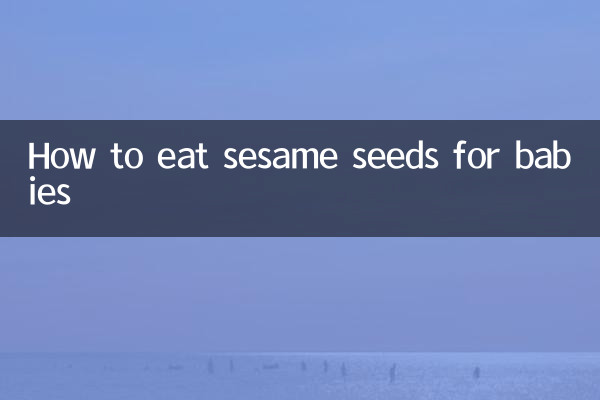How to eat sesame seeds for babies
As parents' attention to the nutrition of infant complementary foods continues to increase, sesame, as an ingredient with high nutritional value, has gradually become a hot topic. In the past 10 days, the discussion on the Internet about adding sesame to infant food supplements has focused on safety, nutritional value and consumption methods. This article will combine the latest hot topics to provide parents with a structured guide to infant sesame complementary foods.
1. Nutritional value of sesame seeds and suitability for infants

Sesame seeds are rich in calcium, iron, zinc and unsaturated fatty acids, which are essential for infant growth and development. According to the dietary guidelines for Chinese residents, babies can gradually try sesame products after they are 6 months old, but they need to pay attention to the risk of allergies. The following is a nutritional comparison between sesame and other common complementary foods:
| Nutrients | Sesame powder (per 10g) | Baby rice cereal (per 10g) | Apple puree (per 10g) |
|---|---|---|---|
| Calcium(mg) | 97.5 | 3.2 | 0.3 |
| Iron(mg) | 2.9 | 0.4 | 0.1 |
| Zinc (mg) | 0.6 | 0.2 | 0.01 |
2. Safe ways to eat
1.first try: It is recommended to add it for the first time after 8 months of age. Start with 1/4 teaspoon sesame powder and observe for 3 consecutive days if there is no allergic reaction before increasing the amount.
2.edible form: Must be ground into fine powder or made into sesame paste. Whole sesame seeds may cause choking.
3.Matching suggestions: Can be mixed with rice cereal and porridge. The latest popular recipe on the Internet is "banana sesame puree".
| age in months | Recommended amount per serving | Frequency of consumption | Recommended form |
|---|---|---|---|
| June-August | ≤1g | 2 times a week | Superfine sesame powder |
| September-December | 2-3g | 3 times a week | Tahini/sesame paste |
| 1 year old and above | 3-5g | Optional daily | sesame products |
3. Recently popular sesame food supplement formulas
According to the data from Xiaohongshu, Douyin and other platforms in the past 10 days, the following three formulas are the most discussed:
| Recipe name | Material ratio | Production points | heat index |
|---|---|---|---|
| Calcium supplemented sesame egg yolk puree | 2g cooked sesame seeds + 1 egg yolk | Grind the sesame seeds first and then mix in the egg yolks | ★★★☆ |
| Digestive Sesame Banana Soup | 1g sesame powder + half banana | Mash bananas and sprinkle with sesame powder | ★★★★ |
| Iron supplement sesame liver puree | 3g sesame paste + 10g pork liver | Steam pork liver and stir in sesame paste | ★★★ |
4. Things to note and hot topics of discussion online
1.Allergy warning: Weibo data shows that the number of views of the #InfantSesameAllergy# topic has increased by 15% in the past 7 days. After consuming it for the first time, you need to observe symptoms such as rash and diarrhea.
2.Quality selection: Zhihu hot post emphasizes that organic sesame seeds should be used without additives and roasted at low temperature.
3.Save method: Homemade sesame powder needs to be refrigerated and used within 7 days, which has become a focus of discussion among mothers recently.
4.Chinese and Western medicine perspectives: The Douyin doctor account suggests that babies with weak spleen and stomach should reduce their sesame intake, which is a hot topic in conflict with traditional Chinese medicine theory.
5. Summary of recommendations from professional organizations
| Organization name | Core recommendations | Release time |
|---|---|---|
| Chinese Nutrition Society | After 10 months of age, you can consume 3g of sesame products per day | 2023 new guide |
| WHO | It is recommended to include sesame seeds in a varied diet for infants | 2022 global standards |
| American Academy of Pediatrics | Sesame is a medium to high risk allergen and should be added with caution | April 2023 |
In summary, sesame is a "nutrition expert" for baby food supplements, and its maximum value can only be achieved by using it correctly. It is recommended that parents consult a pediatrician before adding supplements, feed scientifically based on the infant's individual conditions, and continue to pay attention to the latest parenting nutrition research results.

check the details

check the details